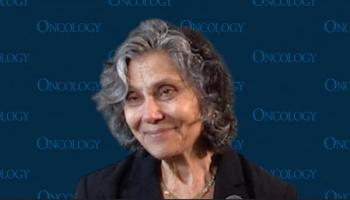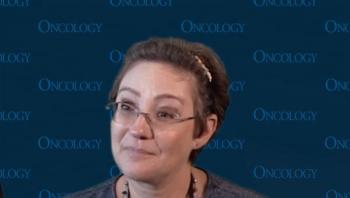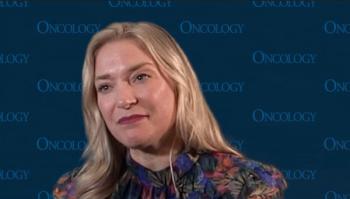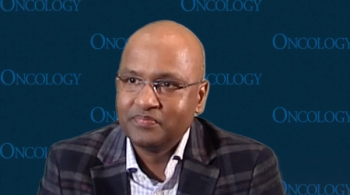
Breast Cancer
Latest News
Latest Videos

CME Content
More News

Black male patients with breast cancer appear to experience worse survival outcomes compared with White patients when controlling for clinicopathological variables, according to Jason (Jincong) Q. Freeman, MPH, MS.

Results from the ECOG-ACRIN E4112 trial appear to support the use of DCIS scores for identifying patients with breast cancer who may be eligible to omit radiotherapy following MRI-guided surgery.

The FDA has set a Prescription Drug User Fee Act date of June 29, 2024 for SH-105 as a treatment for patients with ovarian cancer or breast cancer.

Data from the phase 2 A-PLUS trial indicate that bevacizumab plus chemotherapy prior to whole brain radiotherapy may be an efficacious systemic strategy for intractable brain and extracranial metastases stemming from breast cancer.

Providers should inform patients with breast cancer that selecting later-line therapies following prior treatment with CDK4/6 inhibitors is a “developing area,” says Abigail M. Johnston, JD.

Tucatinib plus trastuzumab emtansine shows a progression-free survival improvement in HER2-positive breast cancer in the phase 3 HER2CLIMB-02 trial, says Sara A. Hurvitz, MD, FACP.

Sarah Donahue, MPH, NP, discusses her strategy for administering doxorubicin, cyclophosphamide, and antiemetics to manage nausea following trastuzumab deruxtecan therapy for patients with hormone receptor–positive breast cancer.

Fatigue and mouth sores are some of the common adverse effects associated with treatment using palbociclib or ribociclib, says Sarah Donahue, MPH, NP.

Treatment with CDK4/6 inhibitors does not appear to result in severe neutropenic fever compared with chemotherapy for breast cancer, according to Sarah Donahue, MPH, NP.

Susan Dent, MD, delves into the exploration of front-line treatment options for triple-positive breast cancer and examines strategies for restaging in the event of disease progression after first-line therapy.

Data from the phase 3 NATALEE trial highlight a positive toxicity profile for ribociclib as an adjuvant therapy for patients with hormone receptor–positive, HER2-negative breast cancer, says Neil M. Iyengar, MD.

Future research will focus on ctDNA dynamics change over time in the full translational cohort of patients with hormone receptor–positive breast cancer in the phase 3 monarchE study, says Stephanie L. Graff, MD.

Findings from a phase 3 trial highlight regression of central nervous system metastases across all heavily pretreated breast cancer subtypes with Bria-IMT.

Findings from a National Cancer Database analysis highlight no statistically significant differences in survival outcomes with chemotherapy for patients over 81 years old with triple-negative breast cancer compared with those who do not receive chemotherapy.


Combining anastrozole with palbociclib, trastuzumab, and pertuzumab as a frontline therapy for hormone receptor–positive, HER2-positive breast cancer may avoid some of the toxicities associated with chemotherapy, says Amy Tiersten, MD.


During a continuing medical education activity hosted by PER, Paolo Tarantino, MD, discussed HER2-low breast cancer and emerging treatment options to fight the disease.




It may be possible to use anastrozole plus palbociclib, trastuzumab, and pertuzumab in place of chemotherapy in the frontline setting for hormone receptor–positive, HER2-positive metastatic breast cancer, says Amy Tiersten, MD.

A future phase 2 trial may compare anastrozole plus a CDK4/6 inhibitor and trastuzumab or pertuzumab with chemotherapy plus trastuzumab and pertuzumab in hormone receptor–positive, HER2-positive metastatic breast cancer.

Oncoplastic surgery requires collaboration between different surgical teams, pathologists, and radiologists to ensure optimal cosmetic and survival outcomes for patients with breast cancer, says Roshani Patel, MD, FACS.









































